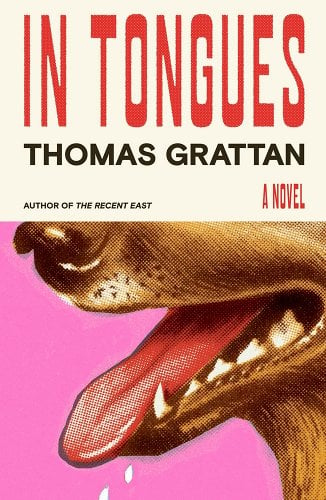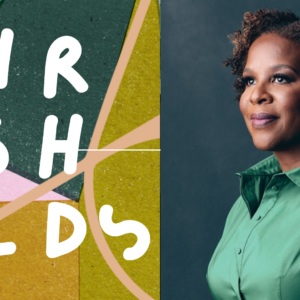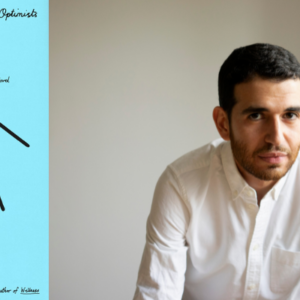On the night Alan, my first serious boyfriend, dumped me, I lay awake on the couch I called ours, though he’d been the one to pay for it, waiting for anger or sadness or relief to come. What showed up instead was the suspended feeling that captures me from time to time even now, like flinging myself from a diving board so I’m not rising or falling but still. That weightlessness stayed as I packed everything worth taking into a pair of duffel bags and stole two hundred dollars from the drawer where Alan kept cash. It held steady as I drove to a dealership, its cars’ windshields laced with frost, and sold my own, lingered as I hitchhiked to the bus station where I waited in line behind a woman who took forever at the ticket counter, the clerk’s mustache trembling with annoyance as she asked one question, then another, a custodian next to us smacking a mop up and down. But then another clerk showed up, sharp lines around her mouth and eyes, and said, “Next.” And, as my bags and I made it to the counter and she asked, “Where to?” my descent began, so I said the first and maybe only place that came to mind, one I’d never been to before.
For that daylong bus ride from Minneapolis to New York, stillness switched to falling, though as we passed billboards about all-you-can-eat buffets and abortion, as towns came and went with aluminum-sided sameness, I itched with the excitement of not knowing where I’d land.
Where I finally landed was an apartment in an attic above a garage in Bay Ridge, Brooklyn, a job stocking shelves at the Food Land across the street. Car exhaust crept through the apartment’s floor, so I left the windows cracked open and moved the sofa—a pullout, according to the landlord, though its pullout mechanism had rusted itself closed—next to the window. But the apartment was cheap. The landlord hadn’t even asked for a security deposit. This was a sad relief, cheapness my only horizon. As I lay on that sofa each night, light from the Food Land sign searing through my window, I wanted to return to that line in the bus station and name some other city instead. But I would’ve been met with disappointment anywhere, been shocked by it, too. That was me then, surprised by results as inevitable as a math problem’s solution, most due to how easily and often I jumped, with no plan for what I’d do once I’d thrown myself into the air.
At Food Land I stocked shelves and organized inventory under the supervision of a man named Thor. And though the job wasn’t what I’d hoped for, its boring purpose was all I had to hold on to, so I took it seriously. I made sure labels on cans were perfectly straight until the repetition of graphic and word (Baked Beans, Baked Beans, Baked Beans) felt like art. Kept the back area so clean that even Thor, who I sensed didn’t like me, grudgingly said, “You’re making it harder for the mice,” his compliment a warm hand on my cheek.
A few weeks into that job, I asked one of the cashiers a question. She looked shocked.
“I didn’t know,” she said. Her name was Marcy. “Didn’t know what?” I asked.
Marcy had small features and wore a product in her hair that made it look perpetually wet. She admitted that they’d all thought, with my dark hair and pale skin, clothes a cheap approximation of what was fashionable, that I was from some country that used to be part of Russia and “ended in -stan,” curse words being my only English.
“I know a lot of words,” I answered, then told her I had something to do in the dairy case.
I saw Marcy again an hour later, both of us in the store’s back alley on a cigarette break. The dumpster’s rot perfumed the air.
“I still can’t believe you speak English,” she said.
I answered with a series of complicated English words—onomatopoeia and incumbent and lackadaisical. It had rained earlier that day. Water plinked from a gutter.
“You’re weird,” Marcy said, then asked where I was from. I told her.
“Maybe what’s weird here is normal there,” she said. “You sound like a philosopher,” I answered.
“You sound like you’re making fun of me.”
“I wasn’t making fun,” I said. I hoped Marcy and I might become friends. I had no friends in New York. Spent days off from work walking until blisters collared my heels, or smoking too much and lying on the couch, wishing the apartment had come with a television. “I was weird in Minnesota, too.”
I returned from my break. Thor saw me and said, “Was looking for you.”
Thor seemed eternally annoyed. He could rest several boxes on his gut and called everything, from a person he didn’t like to a difficult stain, a faggot. This was how he talked, though I also sensed it was his way of letting me know he was onto me. Each time he said that word, I picked up more boxes than was comfortable or deepened my voice. My attempts at passing only made it worse.
“There’s meat,” he said.
Thor spoke in as few words as possible. Whenever I asked for clarification, he said the same words again, sometimes louder.
I walked to the cooler, saw it was low on stew beef, and went into the back to get some.
At home that night, I was unsure if I wanted to jerk off or cry. I did both, half-heartedly, waking up hours later to a shivering light. The L in the Food Land sign was beginning to go. The next day, I saw Marcy and said, “Welcome to Food And.” She looked at me like I had something stuck in my teeth and was deciding whether or not to tell me.
One night after work, I took the subway to Prospect Park. I walked into the woods where men met for sex, one of the few things then that offered me a break from failure’s blunt noise. If I found someone who was game, it was usually rough and fast, the men haggard-looking or so masked by hoodies and baseball caps that I felt more than saw them. That night, I met a man with sunglasses on. I began to hum a song about wearing sunglasses at night but he squeezed my jaw with one hand, used the other to lower me to my knees. His dick filled my mouth. Small stones knifed my shins. He came and stepped away, dick bobbing in front of him. “Thank you,” I said, but he didn’t answer.
As I walked out of the park past half-empty bars and brownstones with bikes chained to their fences, it hit me how dangerous what I’d just done was, even more that I didn’t care. I got on the subway, my throat sore from the way it had been used, and said—I did an inordinate amount of talking to myself then—“Well, that got the job done,” though a few minutes later, the train stuck between stops, its bald fluorescents giving everyone a jaundiced hue, I added, “What job is that?” and a man across from me looked up with such disgust that I wondered if I’d been talking for longer. For the rest of the ride I gorged myself on the self-pity I’d grown up with, one I’d first mimicked, then made my own. “It was my special skill,” I told a boyfriend years later. He’d smiled with polite embarrassment, then changed the subject.
__________________________________
From In Tongues by Thomas Grattan. Published by MCD, an imprint of Farrar Straus and Giroux, May 21, 2024. Copyright © 2024 by Thomas Grattan. All rights reserved.













